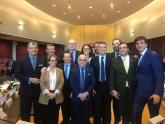Today in Brussels, Mercosur and the European Union concluded negotiations for a Strategic Partnership Agreement, an unprecedented agreement for both blocs and one of the most important ones in history at a global level. This marks the end of a negotiation process which lasted more than 20 years and gained new impetus in 2016.
The Mercosur – EU Strategic Partnership entails the integration of a market of 800 million people, almost one fourth of global GDP, which accounts for more than USD 100 billion in terms of bilateral trade of goods and services. It is a milestone for Argentina's international integration due to the fact that it increases exports from regional economies, consolidates participation by Argentine companies in global value chains, promotes investment in the region, accelerates the process of technological transfer and increases economic competitiveness, all of which will result in an increase in Gross Domestic Product and quality jobs. In addition, it permanently seals the strategic relationship with the EU, thus guaranteeing transparency, predictability and clear rules for economic actors.
The agreement guarantees the main goals of the Mercosur countries since it entails the improvement of conditions in terms of access of exports of goods and services, while establishing a transition period for the trade opening of European goods and services and maintains tools for industrial development in sectors such as intellectual property, government procurement and trade defence measures.
The agreement transcends mere commercial purposes and it a turning point in Argentina's international integration and in its economic development process. In addition, it is the result of an effort to establish dialogue, coordination and understanding between the countries of Mercosur, their governments, the private sector, chambers from several industries and trade unions from each of them. Additionally, it strengthens Mercosur internally and it consolidates and expands its agenda in terms of international integration.
The EU is the main global investor, with an investment stock amounting to more than 30% of the global total. It accounts for 17% of global purchases of goods and services and for 20% of global GDP. The agreement will offer opportunities to export to a market of more than 500 million people with an average GPD per capita of USD 34.000 and to access a more diverse offer and better quality products at more competitive prices for our industries and consumers.
Among the main pillars of the agreement, the following achievements of Mercosur should be highlighted:
- It offers better institutional quality: it creates a strategic and permanent political, cultural and economic bond with the EU. In addition, it presents transparent and consensus-based rules, which reduces discretion in the implementation of economic policies.
- It improves the competitiveness of the Argentine economy: it makes conditions in terms of access to goods, services and investments more dynamic by reducing and eliminating restrictions. It also makes trade operations simpler, and it facilitates access to intermediate goods, technology and supplies which are necessary to produce value-added products.
- It establishes a transition period: the agreement will be implemented gradually so as to guarantee that Argentina's economy will adapt to international competition. In the case of Mercosur countries, export tariffs will be removed over a period of 10 to 15 years, while the EU has agreed to lift tariffs immediately, which is unprecedented in other negotiations by the European bloc.
- It favours regional integration: it marks a new stage in the relationship between Mercosur countries, which will make intraregional trade more dynamic and will entail new commitments in terms of movement, regulatory harmonization and the simplification of internal operations.
- It offers benefits for SMEs: it includes special programmes which facilitate their integration with global value chains, technical assistance, participation in government procurement, joint ventures, partnerships, business networks, transfer of knowledge and financial assistance.
- It promotes investment: it facilitates foreign investment by providing certain and stable rules. Other countries and blocs that have signed agreements with the EU have significantly increased their FDI capability.
Press Release No. 260/19


